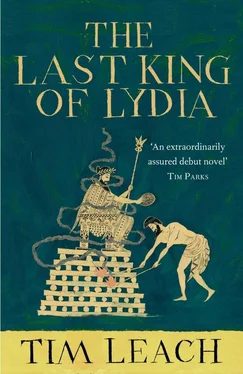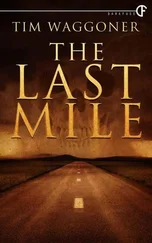Tim Leach - The Last King of Lydia
Здесь есть возможность читать онлайн «Tim Leach - The Last King of Lydia» весь текст электронной книги совершенно бесплатно (целиком полную версию без сокращений). В некоторых случаях можно слушать аудио, скачать через торрент в формате fb2 и присутствует краткое содержание. Год выпуска: 2013, ISBN: 2013, Издательство: Atlantic Books Ltd, Жанр: Исторические приключения, на английском языке. Описание произведения, (предисловие) а так же отзывы посетителей доступны на портале библиотеки ЛибКат.
- Название:The Last King of Lydia
- Автор:
- Издательство:Atlantic Books Ltd
- Жанр:
- Год:2013
- ISBN:9780857899200
- Рейтинг книги:5 / 5. Голосов: 1
-
Избранное:Добавить в избранное
- Отзывы:
-
Ваша оценка:
- 100
- 1
- 2
- 3
- 4
- 5
The Last King of Lydia: краткое содержание, описание и аннотация
Предлагаем к чтению аннотацию, описание, краткое содержание или предисловие (зависит от того, что написал сам автор книги «The Last King of Lydia»). Если вы не нашли необходимую информацию о книге — напишите в комментариях, мы постараемся отыскать её.
The Last King of Lydia — читать онлайн бесплатно полную книгу (весь текст) целиком
Ниже представлен текст книги, разбитый по страницам. Система сохранения места последней прочитанной страницы, позволяет с удобством читать онлайн бесплатно книгу «The Last King of Lydia», без необходимости каждый раз заново искать на чём Вы остановились. Поставьте закладку, и сможете в любой момент перейти на страницу, на которой закончили чтение.
Интервал:
Закладка:
‘How am I supposed to make my peace with that?’
‘However you please. Manufacture a few acts of mercy. As you did with the Phocaeans. Pretend that it means something.’ Harpagus exclaimed suddenly, ‘Oh Gods. You must have had a miserable life these past years,’ he said. ‘Thinking I wished you dead. I did wonder why you always seemed so nervous.’
‘I am glad I amuse you.’
‘You must feel quite the fool.’
Croesus said nothing.
‘It made you feel important again, didn’t it? That you were so significant that I would do anything to get rid of you? That is why you believed it. I am sorry to offend your vanity. But your life has no value. Not any more.’
‘That’s enough,’ Croesus said softly.
Harpagus shrugged. ‘Well, it doesn’t much matter.’ He lifted a scroll from the table. ‘A messenger came in today with this. You have been recalled to the king’s service.’
‘What?’
‘Our campaign is almost done here, and Cyrus desires your counsel. There is something that he would like your help with. So, whether or not you believe me, you will be out of my reach soon enough.’
‘When do I leave?’
‘Tomorrow. Go and sleep, Croesus. You will have to leave just after dawn, and you have a long journey ahead of you.’
Croesus nodded. He stood, and walked to the entrance. He paused there, and looked back over his shoulder at Harpagus.
‘Did you kill him?’ Croesus said.
‘Astyages?’
‘Yes.’
‘It does not matter, does it?’
Croesus opened his mouth to reply, hesitated, and swallowed what he had been about to say. Instead he said, ‘What is it, by the way?’
‘What is what?’
‘This project that Cyrus wants my help with?’
‘Oh. That. Nothing of consequence,’ Harpagus said. He looked again at the parchment, and then back at Croesus. ‘He’s invading Babylon. That’s all.’
8
Babylon.
As a king, he had listened to every story of Babylon that travellers and merchants brought back from the East. It was the largest city that would ever be built, they said. There was a sacred tower, ramped with steps that went above the clouds; one could climb to the top and speak to the Gods, and priestesses would remain at night to lie with them. The Ishtar Gate was so beautiful that men had torn out their eyes at the sight of it, so that it would be the last thing they ever saw. And the gardens were the greatest treasure of all, where water ran uphill, where delicate flowers and thirsty trees flourished impossibly in the desert city. It was a place where the rule of nature had been suspended.
Croesus discovered later that, as it was known that news of Babylon was a sure way into his presence, half of what he had been told was pure fantasy spun by those who had never been near the city. But this only added to the mystery of Babylon; a city that existed half in myth.
The city rarely left his thoughts as he travelled east along the Royal Road with a company of soldiers, winding along the old trading paths, bearing messages and treasures for the king. They met many merchant caravans heading in the opposite direction on these gold roads, traders from a dozen different nations drawn west, for commerce always followed in the wake of war.
At the forts and cities and way stations on the road, Croesus sat each night and listened to the travellers exchanging stories. Of Cyrus in the east with his invincible army; of Harpagus in the west, conquering city after city, becoming a figure of almost legendary terror to the Ionians; of the Hellenes across the sea, poor, backward cities that thought too highly of themselves; of the decadent Egyptians to the south and east, the ancient people whose civilization had existed long enough to witness the rise and fall of great mountain ranges, let alone the hundred human kingdoms that had faded to memory and dust. They traded stories about the Scythians and Massagetae to the north, nomads who drank blood from skulls and slept in the open like dogs. Once, they spoke of the fall of Sardis, a traveller telling the tale he had heard that a man called Hyroades had scaled the impossible south wall and let the army in. The others dismissed it as impossible.
Sometimes his own name was mentioned in these stories. None of the travellers would have thought that the grey-haired slave who sat silent in the corner, his skin like that of an old drum, off-white and taut against the bone, his eyes deep and weary, could once have been a king. If he ever was asked his name, he said he was Solon, Tellus, or Isocrates. The Persian soldiers exchanged knowing glances, but never gave him away. They let Croesus listen to the tales that were told of him.
Some travellers said Croesus was a wise man, and had engineered the irresistible Persian advance. Others countered that Croesus had lost his kingdom through foolishness, and was hardly a man to turn to for counsel (Croesus, listening silently, could not fault this logic). There were those who insisted that he had died in Sardis, that the stories of his service to the Persian king were just that, stories spun for fools to listen to.
These nights of storytelling were more than just a way to pass the evenings in company. For the Persians, they were a way home. They hunted the army as though it were a colossus that wandered the continent, following its rumours like a spoor. The closer they approached, the more stories of the army multiplied and contradicted each other. Perhaps, Croesus thought, they would wander perpetually in its wake, pursuing false rumours and growing old in its shadow, as those in the underworld are eternally locked into some endless task that seems just within reach, but that will never be fulfilled.
After months on the road, they finally came across its trail, the mile-wide wound in the land that the army had left in its wake. They pressed on hard, as though they were homesick travellers returning to their city from exile. Just as the sun was about to set, they finally came upon the army itself, pressed up against the Gyndes river, like a woman curled close against her lover.
The soldiers cried out at the sight of it, thinking of old companions they had thought they would never see again, the new stories that they would tell and hear. Croesus kept silent, and thought of Maia and Isocrates, Gyges and Cyrus.
Slaves and soldiers together made their way down to the camp, to be reunited with their friends.
Croesus had long since become proficient at reading the mood of the army. It took on the character of a single giant creature, and every individual, in his or her own small way, merely manifested the feeling of the whole. Croesus sometimes wondered if kings and generals truly lived apart from this collective as a rider does from his horse, or if they too were parts of this great beast, forced merely to follow its will, not to direct it.
As soon as he entered the encampment, he saw that something was wrong. Most of the men were slumped on the ground. Those who were alone stared out blankly, whilst others clustered together in groups to talk in furious whispers. The captains did nothing to restore order, and no one would talk to the newcomers. When they saw Croesus, they stared at him, uncertain of what to make of his arrival in the context of whatever was troubling them. In all his years of service, the soldiers had yet to decide if he were favoured by the Gods or no. The army had not lost a battle whilst he had been with them, it was true. But bad luck had followed him as a king, and there were many who thought it was only a matter of time before his ill fortune affected the Persian cause.
He thought of plague or famine, but there were no signs of either. Perhaps some great opposing army was too close to run from, and would soon come to butcher them all. Perhaps Croesus had found the army at last only to be destroyed along with it. He wondered if Cyrus had taken ill, and felt a sudden surge of fear.
Читать дальшеИнтервал:
Закладка:
Похожие книги на «The Last King of Lydia»
Представляем Вашему вниманию похожие книги на «The Last King of Lydia» списком для выбора. Мы отобрали схожую по названию и смыслу литературу в надежде предоставить читателям больше вариантов отыскать новые, интересные, ещё непрочитанные произведения.
Обсуждение, отзывы о книге «The Last King of Lydia» и просто собственные мнения читателей. Оставьте ваши комментарии, напишите, что Вы думаете о произведении, его смысле или главных героях. Укажите что конкретно понравилось, а что нет, и почему Вы так считаете.












